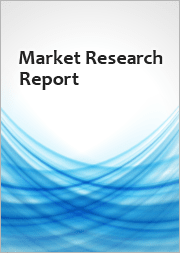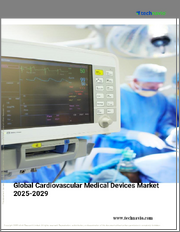
|
시장보고서
상품코드
1813967
심혈관 기기 시장 규모, 점유율, 동향 분석 보고서 : 제품별, 지역별, 부문별 예측(2025-2033년)Cardiovascular Devices Market Size, Share & Trends Analysis Report By Product (Diagnostic & Monitoring (ECG, Holter, Mobile Cardiac Telemetry), Surgical Devices (Pacemakers, Stents)), By Region, And Segment Forecasts, 2025 - 2033 |
||||||
심혈관 기기 시장 요약
세계 심혈관 기기 시장 규모는 2024년 537억 달러로 추정되며, 2033년에는 1,067억 달러에 달할 것으로 예상되며, 2025년부터 2033년까지 CAGR 7.8%로 성장할 것으로 예상됩니다.
심혈관질환은 전 세계적으로 가장 널리 퍼져 있는 질병 중 하나입니다.
2024년 1월 미국심장협회(AHA)는 심혈관질환(CVD)이 미국 내 사망원인 1위로 93만 1,578명의 목숨을 앗아갔으며, 모든 암과 만성 호흡기질환으로 인한 사망자 수를 합친 것보다 더 많다고 보고했습니다. 따라서 심혈관 기기는 심장 질환을 정확하게 감지하고 완화하는 데 있어 매우 중요하며, 시장 확대에 박차를 가하고 있습니다. 이 시장의 주요 촉진요인으로는 빠른 기술 개발, 저렴한 가격의 효과적인 장비의 증가, 최소침습적 시술에 대한 수요 증가 등이 있습니다.
만성 심혈관계 질환 환자 수가 급증하면서 시장 확대에 기여하고 있습니다. 심혈관질환의 증가는 심혈관 기기에 대한 수요 증가를 가져왔습니다. 심장 및 관상동맥 스텐트는 가장 중요한 심혈관 기기 중 하나입니다. 심장마비, 관상동맥질환, 심방세동, 막힌 동맥 확장 등 생명에 심각한 위험을 초래할 수 있는 심장질환의 치료를 용이하게 합니다. 2024년 5월, WHO는 심혈관계 질환(CVDs)이 유럽에서 신체 장애와 조기 사망의 가장 큰 원인으로 연간 사망자 수의 42.5% 이상을 차지하며 매일 약 1만 명씩 사망하고 있다고 보고했습니다. 남성이 CVD로 사망할 확률은 여성의 약 2.5배이며, 동유럽과 중앙아시아의 젊은 층(30-69세)은 서유럽의 젊은 층에 비해 5배 가까이 위험도가 높습니다.
목차
제1장 조사 방법과 범위
제2장 주요 요약
제3장 심혈관 기기 시장 변수, 동향, 범위
- 시장 계통 전망
- 상부 시장 전망
- 관련/부수 시장 전망
- 침투와 성장 전망 매핑
- 시장 역학
- 시장 성장 촉진요인 분석
- 시장 성장 억제요인 분석
- 심혈관 기기 시장 분석 툴
- 업계 분석 - Porter's Five Forces 분석
- PESTEL 분석
- 파이프라인 분석
제4장 심혈관 기기 : 제품 추정·동향 분석
- 심혈관 기기 시장 : 제품의 주요 포인트
- 심혈관 기기 시장 : 제품 동향과 시장 점유율 분석, 2024년 및 2033년
- 진단·모니터링 기기
- 진단·모니터링 기기 추정과 예측, 2021-2033년
- 외과용 기기
- 외과용 기기 시장 추정과 예측, 2021-2033년
제5장 심혈관 기기 시장 : 국가별 및 제품별 지역 추정·동향 분석
- 지역 대시보드
- 시장 규모, 예측 동향 분석, 2021-2033년 :
- 북미
- 미국
- 캐나다
- 유럽
- 영국
- 독일
- 프랑스
- 이탈리아
- 스페인
- 노르웨이
- 스웨덴
- 덴마크
- 아시아태평양
- 일본
- 중국
- 인도
- 호주
- 한국
- 태국
- 라틴아메리카
- 브라질
- 아르헨티나
- 멕시코
- 중동 및 아프리카
- 남아프리카공화국
- 사우디아라비아
- 아랍에미리트
- 쿠웨이트
제6장 경쟁 구도
- 기업/경쟁 분류
- 벤더 상황
- 주요 판매대리점 및 채널 파트너 리스트
- Key customers
- Key company market share analysis, 2024년
- 시장 진입 기업 분류
- Abbott
- GE HealthCare
- Edwards Lifesciences Corporation
- W. L. Gore & Associates, Inc.
- Siemens Healthcare GmbH
- BIOTRONIK SE & Co. KG
- Canon Medical Systems Asia Pte. Ltd.
- B. Braun SE
- LivaNova PLC
- Cardinal Health
- Medtronic
- Boston Scientific Corporation
Cardiovascular Devices Market Summary
The global cardiovascular devices market size was estimated at USD 53.7 billion in 2024 and is projected to reach USD 106.7 billion by 2033, growing at a CAGR of 7.8% from 2025 to 2033. Cardiovascular disease is one of the most prevalent medical conditions worldwide.
In January 2024, the American Heart Association (AHA) reported that cardiovascular disease (CVD) was the leading cause of death in the U.S., claiming 931,578 lives, surpassing deaths from all cancers and chronic respiratory diseases combined. Therefore, cardiovascular devices are crucial in accurately detecting and mitigating heart disorders, fueling market expansion. The main drivers of this market include rapid technical development, an increase in affordable and effective devices, and rising demand for minimally invasive procedures.
The surge in the number of cases of chronic cardiovascular disorders contributes to the market growth. Increasing cardiovascular disorders have led to an increased demand for cardiovascular devices. Heart or coronary artery stents are among the most essential cardiovascular devices. They facilitate the treatment of cardiac illnesses considered a serious risk to life, namely heart attacks, coronary disease, atrial fibrillation, and the expansion of clogged arteries. In May 2024, the WHO reported that cardiovascular diseases (CVDs) are the top cause of disability and premature death in Europe, accounting for over 42.5% of annual deaths, around 10,000 daily. Men are nearly 2.5 times more likely to die from CVDs than women, with young people (ages 30-69) in Eastern Europe and Central Asia facing a nearly fivefold higher risk compared to their Western European counterparts.
Global Cardiovascular Devices Market Report Segmentation
This report forecasts revenue growth at global, regional, and country levels and provides an analysis of the latest industry trends in each of the sub-segments from 2021 to 2033. For this study, Grand View Research has segmented the global cardiovascular devices market report based on product and region:
- Product Outlook (Revenue, USD Million, 2021 - 2033)
- Diagnostic & Monitoring Devices
- ECG
- Implantable Cardiac Monitors
- Holter Monitors
- Mobile Cardiac Telemetry
- MRI
- Cardiovascular Ultrasound
- 2D
- 3D/4D
- Doppler
- Cardiac Diagnostic Catheters
- PET Scanner
- Surgical Devices
- Cardiac Resynchronization Therapy (CRT)
- CRT-Defibrillator
- CRT-Pacemaker
- Implantable Cardioverter Defibrillators (ICDs)
- Single Chamber ICDs
- Dual Chamber ICDs
- Pacemakers
- Conventional Pacemakers
- Leadless Pacemakers
- Coronary Stents
- Catheters
- Guidewires
- Cannula
- Valves
- Occlusion Devices
- Regional Outlook (Revenue in USD Million, 2021 - 2033)
- North America
- U.S.
- Canada
- Europe
- UK
- Germany
- France
- Italy
- Spain
- Sweden
- Norway
- Denmark
- Asia Pacific
- Japan
- China
- India
- Australia
- Thailand
- South Korea
- Latin America
- Brazil
- Argentina
- Mexico
- Middle East and Africa
- Saudi Arabia
- South Africa
- UAE
- Kuwait
Table of Contents
Chapter 1. Methodology and Scope
- 1.1. Market Segmentation & Scope
- 1.1.1. Product
- 1.1.2. Regional scope
- 1.1.3. Estimates and forecast timeline
- 1.2. Research Methodology
- 1.3. Information Procurement
- 1.3.1. Purchased database
- 1.3.2. GVR's internal database
- 1.3.3. Secondary sources
- 1.3.4. Primary research
- 1.3.5. Details of primary research
- 1.3.5.1. Data for primary interviews in North America
- 1.3.5.2. Data for primary interviews in Europe
- 1.3.5.3. Data for primary interviews in Asia Pacific
- 1.3.5.4. Data for primary interviews in Latin America
- 1.3.5.5. Data for Primary interviews in MEA
- 1.4. Information or Data Analysis
- 1.4.1. Data analysis models
- 1.5. Market Formulation & Validation
- 1.6. Model Details
- 1.6.1. Commodity flow analysis (Model 1)
- 1.6.2. Approach 1: Commodity flow approach
- 1.6.3. Volume price analysis (Model 2)
- 1.6.4. Approach 2: Volume price analysis
- 1.7. List of Secondary Sources
- 1.8. List of Primary Sources
- 1.9. Objectives
Chapter 2. Executive Summary
- 2.1. Market Outlook
- 2.2. Segment Outlook
- 2.2.1. Product outlook
- 2.2.2. Regional outlook
- 2.3. Competitive Insights
Chapter 3. Cardiovascular Devices Market Variables, Trends & Scope
- 3.1. Market Lineage Outlook
- 3.1.1. Parent market outlook
- 3.1.2. Related/ancillary market outlook
- 3.2. Penetration & Growth Prospect Mapping
- 3.3. Market Dynamics
- 3.3.1. Market driver analysis
- 3.3.1.1. Increasing prevalence of cardiovascular diseases
- 3.3.1.2. Technological advancements
- 3.3.1.3. Aging population
- 3.3.2. Market restraint analysis
- 3.3.2.1. Regulatory challenges
- 3.3.2.2. High cost of development
- 3.3.1. Market driver analysis
- 3.4. Cardiovascular Devices Market Analysis Tools
- 3.4.1. Industry Analysis - Porter's
- 3.4.1.1. Supplier power
- 3.4.1.2. Buyer power
- 3.4.1.3. Substitution threat
- 3.4.1.4. Threat of new entrant
- 3.4.1.5. Competitive rivalry
- 3.4.2. PESTEL Analysis
- 3.4.2.1. Political landscape
- 3.4.2.2. Technological landscape
- 3.4.2.3. Economic landscape
- 3.4.3. Pipeline Analysis
- 3.4.1. Industry Analysis - Porter's
Chapter 4. Cardiovascular Devices: Product Estimates & Trend Analysis
- 4.1. Cardiovascular Devices Market: Product Key Takeaways
- 4.2. Cardiovascular Devices Market: Product Movement & Market Share Analysis, 2024 & 2033
- 4.3. Diagnostic and Monitoring Devices
- 4.3.1. Diagnostic and monitoring devices estimates and forecasts, 2021 to 2033 (USD Million)
- 4.3.1.1. ECG
- 4.3.1.1.1. ECG market estimates and forecasts, 2021 to 2033 (USD Million)
- 4.3.1.2. Implantable Cardiac Monitors
- 4.3.1.2.1. Implantable cardiac monitors market estimates and forecasts, 2021 to 2033 (USD Million)
- 4.3.1.3. Holter Monitors
- 4.3.1.3.1. Holter monitors market estimates and forecasts, 2021 to 2033 (USD Million)
- 4.3.1.4. Mobile Cardiac Telemetry
- 4.3.1.4.1. Mobile cardiac telemetry market estimates and forecasts, 2021 to 2033 (USD Million)
- 4.3.1.5. MRI
- 4.3.1.5.1. MRI estimates and forecasts, 2021 to 2033 (USD Million)
- 4.3.1.6. Cardiovascular Ultrasound
- 4.3.1.6.1. Cardiovascular ultrasound market estimates and forecasts, 2021 to 2033 (USD Million)
- 4.3.1.6.2. 2D
- 4.3.1.6.2.1. 2D market estimates and forecasts, 2021 to 2033 (USD Million)
- 4.3.1.6.3. 3D/4D
- 4.3.1.6.3.1. 3D/4D market estimates and forecasts, 2021 to 2033 (USD Million)
- 4.3.1.6.4. Doppler
- 4.3.1.6.4.1. Doppler market estimates and forecasts, 2021 to 2033 (USD Million)
- 4.3.1.7. Cardiac Diagnostic Catheters
- 4.3.1.7.1. Cardiac diagnostic catheters market estimates and forecasts, 2021 to 2033 (USD Million)
- 4.3.1.8. PET Scanner
- 4.3.1.8.1. PET scanner market estimates and forecasts, 2021 to 2033 (USD Million)
- 4.3.1.1. ECG
- 4.3.1. Diagnostic and monitoring devices estimates and forecasts, 2021 to 2033 (USD Million)
- 4.4. Surgical Devices
- 4.4.1. Surgical devices market estimates and forecasts, 2021 to 2033 (USD Million)
- 4.4.1.1. Cardiac Resynchronization Therapy (CRT)
- 4.4.1.1.1. Cardiac resynchronization therapy (CRT) market estimates and forecasts, 2021 to 2033 (USD Million)
- 4.4.1.1.2. CRT-Defibrillator
- 4.4.1.1.2.1. CRT-defibrillator market estimates and forecasts, 2021 to 2033 (USD Million)
- 4.4.1.1.3. CRT-Pacemaker
- 4.4.1.1.3.1. CRT-pacemaker market estimates and forecasts, 2021 to 2033 (USD Million)
- 4.4.1.2. Implantable Cardioverter Defibrillators (ICDs)
- 4.4.1.2.1. Implantable cardioverter defibrillators (ICDs) market estimates and forecasts, 2021 to 2033 (USD Million)
- 4.4.1.2.2. Single Chamber ICDs
- 4.4.1.2.2.1. Single chamber ICDs market estimates and forecasts, 2021 to 2033 (USD Million)
- 4.4.1.2.3. Dual Chamber ICDs
- 4.4.1.2.3.1. Dual chamber ICDs market estimates and forecasts, 2021 to 2033 (USD Million)
- 4.4.1.3. Pacemakers
- 4.4.1.3.1. Pacemakers market estimates and forecasts, 2021 to 2033 (USD Million)
- 4.4.1.3.2. Conventional Pacemakers
- 4.4.1.3.2.1. Conventional pacemakers market estimates and forecasts, 2021 to 2033 (USD Million)
- 4.4.1.3.3. Leadless Pacemakers
- 4.4.1.3.3.1. Leadless pacemakers market estimates and forecasts, 2021 to 2033 (USD Million)
- 4.4.1.4. Coronary Stents
- 4.4.1.4.1. Coronary stents market estimates and forecasts, 2021 to 2033 (USD Million)
- 4.4.1.5. Catheters
- 4.4.1.5.1. Catheters market estimates and forecasts, 2021 to 2033 (USD Million)
- 4.4.1.6. Guidewires
- 4.4.1.6.1. Guidewires market estimates and forecasts, 2021 to 2033 (USD Million)
- 4.4.1.7. Cannula
- 4.4.1.7.1. Cannula market estimates and forecasts, 2021 to 2033 (USD Million)
- 4.4.1.8. Valves
- 4.4.1.8.1. Valves market estimates and forecasts, 2021 to 2033 (USD Million)
- 4.4.1.9. Occlusion devices
- 4.4.1.9.1. Occlusion devices market estimates and forecasts, 2021 to 2033 (USD Million)
- 4.4.1.1. Cardiac Resynchronization Therapy (CRT)
- 4.4.1. Surgical devices market estimates and forecasts, 2021 to 2033 (USD Million)
Chapter 5. Cardiovascular Devices Market: Regional Estimates & Trend Analysis by Country and Product
- 5.1. Regional Dashboard
- 5.2. Market Size, & Forecasts Trend Analysis, 2021 to 2033:
- 5.3. North America
- 5.3.1. U.S.
- 5.3.1.1. Key country dynamics
- 5.3.1.2. Regulatory framework/ reimbursement structure
- 5.3.1.3. Competitive scenario
- 5.3.1.4. U.S. market estimates and forecasts 2021 to 2033 (USD Million)
- 5.3.2. Canada
- 5.3.2.1. Key country dynamics
- 5.3.2.2. Regulatory framework/ reimbursement structure
- 5.3.2.3. Competitive scenario
- 5.3.2.4. Canada market estimates and forecasts 2021 to 2033 (USD Million)
- 5.3.1. U.S.
- 5.4. Europe
- 5.4.1. UK
- 5.4.1.1. Key country dynamics
- 5.4.1.2. Regulatory framework/ reimbursement structure
- 5.4.1.3. Competitive scenario
- 5.4.1.4. UK market estimates and forecasts 2021 to 2033 (USD Million)
- 5.4.2. Germany
- 5.4.2.1. Key country dynamics
- 5.4.2.2. Regulatory framework/ reimbursement structure
- 5.4.2.3. Competitive scenario
- 5.4.2.4. Germany market estimates and forecasts 2021 to 2033 (USD Million)
- 5.4.3. France
- 5.4.3.1. Key country dynamics
- 5.4.3.2. Regulatory framework/ reimbursement structure
- 5.4.3.3. Competitive scenario
- 5.4.3.4. France market estimates and forecasts 2021 to 2033 (USD Million)
- 5.4.4. Italy
- 5.4.4.1. Key country dynamics
- 5.4.4.2. Regulatory framework/ reimbursement structure
- 5.4.4.3. Competitive scenario
- 5.4.4.4. Italy market estimates and forecasts 2021 to 2033 (USD Million)
- 5.4.5. Spain
- 5.4.5.1. Key country dynamics
- 5.4.5.2. Regulatory framework/ reimbursement structure
- 5.4.5.3. Competitive scenario
- 5.4.5.4. Spain market estimates and forecasts 2021 to 2033 (USD Million)
- 5.4.6. Norway
- 5.4.6.1. Key country dynamics
- 5.4.6.2. Regulatory framework/ reimbursement structure
- 5.4.6.3. Competitive scenario
- 5.4.6.4. Norway market estimates and forecasts 2021 to 2033 (USD Million)
- 5.4.7. Sweden
- 5.4.7.1. Key country dynamics
- 5.4.7.2. Regulatory framework/ reimbursement structure
- 5.4.7.3. Competitive scenario
- 5.4.7.4. Sweden market estimates and forecasts 2021 to 2033 (USD Million)
- 5.4.8. Denmark
- 5.4.8.1. Key country dynamics
- 5.4.8.2. Regulatory framework/ reimbursement structure
- 5.4.8.3. Competitive scenario
- 5.4.8.4. Denmark market estimates and forecasts 2021 to 2033 (USD Million)
- 5.4.1. UK
- 5.5. Asia Pacific
- 5.5.1. Japan
- 5.5.1.1. Key country dynamics
- 5.5.1.2. Regulatory framework/ reimbursement structure
- 5.5.1.3. Competitive scenario
- 5.5.1.4. Japan market estimates and forecasts 2021 to 2033 (USD Million)
- 5.5.2. China
- 5.5.2.1. Key country dynamics
- 5.5.2.2. Regulatory framework/ reimbursement structure
- 5.5.2.3. Competitive scenario
- 5.5.2.4. China market estimates and forecasts 2021 to 2033 (USD Million)
- 5.5.3. India
- 5.5.3.1. Key country dynamics
- 5.5.3.2. Regulatory framework/ reimbursement structure
- 5.5.3.3. Competitive scenario
- 5.5.3.4. India market estimates and forecasts 2021 to 2033 (USD Million)
- 5.5.4. Australia
- 5.5.4.1. Key country dynamics
- 5.5.4.2. Regulatory framework/ reimbursement structure
- 5.5.4.3. Competitive scenario
- 5.5.4.4. Australia market estimates and forecasts 2021 to 2033 (USD Million)
- 5.5.5. South Korea
- 5.5.5.1. Key country dynamics
- 5.5.5.2. Regulatory framework/ reimbursement structure
- 5.5.5.3. Competitive scenario
- 5.5.5.4. South Korea market estimates and forecasts 2021 to 2033 (USD Million)
- 5.5.6. Thailand
- 5.5.6.1. Key country dynamics
- 5.5.6.2. Regulatory framework/ reimbursement structure
- 5.5.6.3. Competitive scenario
- 5.5.6.4. Thailand market estimates and forecasts 2021 to 2033 (USD Million)
- 5.5.1. Japan
- 5.6. Latin America
- 5.6.1. Brazil
- 5.6.1.1. Key country dynamics
- 5.6.1.2. Regulatory framework/ reimbursement structure
- 5.6.1.3. Competitive scenario
- 5.6.1.4. Brazil market estimates and forecasts 2021 to 2033 (USD Million)
- 5.6.2. Argentina
- 5.6.2.1. Key country dynamics
- 5.6.2.2. Regulatory framework/ reimbursement structure
- 5.6.2.3. Competitive scenario
- 5.6.2.4. Argentina market estimates and forecasts 2021 to 2033 (USD Million)
- 5.6.3. Mexico
- 5.6.3.1. Key country dynamics
- 5.6.3.2. Regulatory framework/ reimbursement structure
- 5.6.3.3. Competitive scenario
- 5.6.3.4. Mexico market estimates and forecasts 2021 to 2033 (USD Million)
- 5.6.1. Brazil
- 5.7. MEA
- 5.7.1. South Africa
- 5.7.1.1. Key country dynamics
- 5.7.1.2. Regulatory framework/ reimbursement structure
- 5.7.1.3. Competitive scenario
- 5.7.1.4. South Africa market estimates and forecasts 2021 to 2033 (USD Million)
- 5.7.2. Saudi Arabia
- 5.7.2.1. Key country dynamics
- 5.7.2.2. Regulatory framework/ reimbursement structure
- 5.7.2.3. Competitive scenario
- 5.7.2.4. Saudi Arabia market estimates and forecasts 2021 to 2033 (USD Million)
- 5.7.3. UAE
- 5.7.3.1. Key country dynamics
- 5.7.3.2. Regulatory framework/ reimbursement structure
- 5.7.3.3. Competitive scenario
- 5.7.3.4. UAE market estimates and forecasts 2021 to 2033 (USD Million)
- 5.7.4. Kuwait
- 5.7.4.1. Key country dynamics
- 5.7.4.2. Regulatory framework/ reimbursement structure
- 5.7.4.3. Competitive scenario
- 5.7.4.4. Kuwait market estimates and forecasts 2021 to 2033 (USD Million)
- 5.7.1. South Africa
Chapter 6. Competitive Landscape
- 6.1. Company/Competition Categorization
- 6.2. Vendor Landscape
- 6.2.1. List of key distributors and channel partners
- 6.2.2. Key customers
- 6.2.3. Key company market share analysis, 2024
- 6.3. Market Participant Categorization
- 6.3.1. Abbott
- 6.3.1.1. Company overview
- 6.3.1.2. Financial performance
- 6.3.1.3. Product benchmarking
- 6.3.1.4. Strategic initiatives
- 6.3.2. GE HealthCare
- 6.3.2.1. Company overview
- 6.3.2.2. Financial performance
- 6.3.2.3. Product benchmarking
- 6.3.2.4. Strategic initiatives
- 6.3.3. Edwards Lifesciences Corporation
- 6.3.3.1. Company overview
- 6.3.3.2. Financial performance
- 6.3.3.3. Product benchmarking
- 6.3.3.4. Strategic initiatives
- 6.3.4. W. L. Gore & Associates, Inc.
- 6.3.4.1. Company overview
- 6.3.4.2. Financial performance
- 6.3.4.3. Product benchmarking
- 6.3.4.4. Strategic initiatives
- 6.3.5. Siemens Healthcare GmbH
- 6.3.5.1. Company overview
- 6.3.5.2. Financial performance
- 6.3.5.3. Product benchmarking
- 6.3.5.4. Strategic initiatives
- 6.3.6. BIOTRONIK SE & Co. KG
- 6.3.6.1. Company overview
- 6.3.6.2. Financial performance
- 6.3.6.3. Product benchmarking
- 6.3.6.4. Strategic initiatives
- 6.3.7. Canon Medical Systems Asia Pte. Ltd.
- 6.3.7.1. Company overview
- 6.3.7.2. Financial performance
- 6.3.7.3. Product benchmarking
- 6.3.7.4. Strategic initiatives
- 6.3.8. B. Braun SE
- 6.3.8.1. Company overview
- 6.3.8.2. Financial performance
- 6.3.8.3. Product benchmarking
- 6.3.8.4. Strategic initiatives
- 6.3.9. LivaNova PLC
- 6.3.9.1. Company overview
- 6.3.9.2. Financial performance
- 6.3.9.3. Product benchmarking
- 6.3.9.4. Strategic initiatives
- 6.3.10. Cardinal Health
- 6.3.10.1. Company overview
- 6.3.10.2. Financial performance
- 6.3.10.3. Product benchmarking
- 6.3.10.4. Strategic initiatives
- 6.3.11. Medtronic
- 6.3.11.1. Company overview
- 6.3.11.2. Financial performance
- 6.3.11.3. Product benchmarking
- 6.3.11.4. Strategic initiatives
- 6.3.12. Boston Scientific Corporation
- 6.3.12.1. Company overview
- 6.3.12.2. Financial performance
- 6.3.12.3. Product benchmarking
- 6.3.12.4. Strategic initiatives
- 6.3.1. Abbott
(주말 및 공휴일 제외)


















